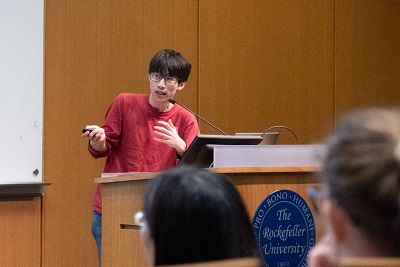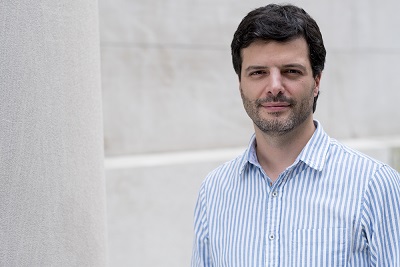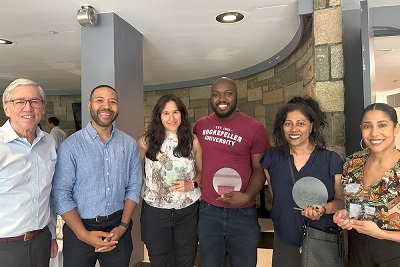Rockefeller’s Pearl Meister Greengard Prize awarded to RNA researcher Joan Steitz

Championing women. Joan Steitz (left) receives the Pearl Meister Greengard Prize from oceanographer and explorer Sylvia Earle in a ceremony at Caspary Auditorium in November. Dr. Steitz was honored for her contributions to RNA research and her role as a champion for women in the sciences.
Joan A. Steitz, a pioneer in the field of RNA biology whose discoveries involved patients with a variety of autoimmune diseases, was awarded the 2012 Pearl Meister Greengard Prize from The Rockefeller University last month.
The prize honors female scientists who have made extraordinary contributions to biomedical science and carries an honorarium of $100,000. It was presented at a ceremony on November 29 at Caspary Auditorium by oceanographer and explorer Sylvia Earle, a National Geographic Explorer in Residence.
“Joan Steitz, in addition to being a leader in the field of RNA biology, has been a role model for young women seeking careers in biomedical research,” says Paul Greengard, Vincent Astor Professor and head of the Laboratory of Molecular and Cellular Neuroscience. “Her success, in the face of gender discrimination early in her career, exemplifies the spirit of the Pearl Meister Greengard Prize.”
The prize was established by Dr. Greengard and his wife, sculptor Ursula von Rydingsvard, in 2004 with proceeds from his 2000 Nobel Prize. The winner is chosen by a committee of 10 jurors, including Marc Tessier-Lavigne, president of The Rockefeller University, and past presidents and Nobel Laureates Torsten N. Wiesel and Paul Nurse.
“Any recognition that calls attention to women’s accomplishments in science is important for the future participation of women,” says Dr. Steitz. “I am deeply honored to be a recipient of the Greengard Prize.”
Dr. Steitz is Sterling Professor of Molecular Biophysics and Biochemistry at Yale University and an investigator at the Howard Hughes Medical Institute. She is best known for discovering and defining the function of RNA-protein complexes called small nuclear ribonucleoproteins (snRNPs), which occur only in the cells of higher organisms. These cellular complexes play a key role in the splicing of pre-messenger RNA, the earliest product of DNA transcription. Both DNA and pre-messenger RNA typically contain numerous nonsense segments called “introns.” Working in the nucleus, snRNPs cut the introns from pre-mRNA and splice together the resulting segments, which together make up messenger RNA.
Dr. Steitz’s research may yield new insights into the diagnosis and treatment of lupus, an autoimmune disease that develops when patients make antibodies against their own DNA, snRNPs or ribosomes, the body’s protein-making factories. She and her colleagues are also studying other snRNPs involved in excising a rare, divergent class of introns and still other snRNPs involved in pre-ribosomal RNA processing.
Dr. Steitz earned her B.S. in chemistry from Antioch College in 1963. She became the sole woman in a class of 10 to begin graduate studies in biochemistry and molecular biology at Harvard, and the first female graduate student to work under Jim Watson’s guidance after another male professor questioned her aspirations for a Ph.D. because she was a woman. During postdoctoral studies at the Medical Research Council’s Laboratory of Molecular Biology in Cambridge, England, she used early methods to determine RNA sequences where ribosomes initiate protein synthesis on bacterial mRNAs. She was appointed assistant professor at Yale in 1970, and in 1979 Dr. Steitz and her colleagues described snRNPs, the building blocks of the spliceosome.
She has received numerous accolades for her work, including the Albany Medical Center Prize in Medicine and Biomedical Research, the Gairdner Foundation International Award, the UNESCO-L’Oreal Award for Women in Science and the Rosalind E. Franklin Award for Women in Science. She is a member of the National Academy of Sciences and the Institute of Medicine, and she received the National Medal of Science in 1986. Since 2007, she has served as a member of Rockefeller’s Committee on Scientific Affairs, a committee that advises the president and the Board of Trustees on all scientific matters.


